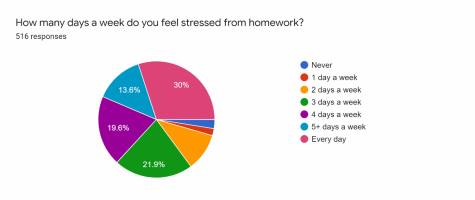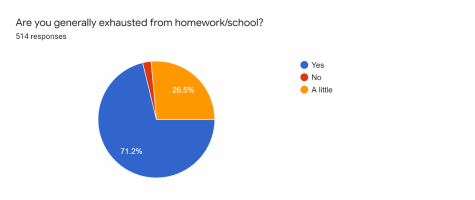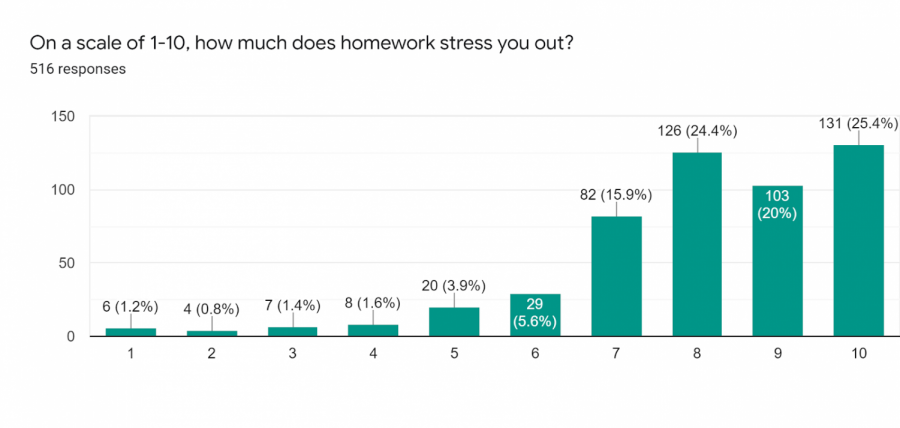Homework is Stressing Students Out
Opinion
Despite efforts to reduce it, homework has been a major cause of stress for students all throughout middle and high school. It has placed pressure on students to do well in school for as long as the institution has been in place.
The stress from modern-day schooling is at deeply concerning amounts. Ask the 516 Westwood students who completed a survey conducted this year, asking students to rate their homework-related stress on a scale of one to ten. An overwhelming majority of 85.7% said that their stress was either seven, eight, nine, or ten.
It doesn’t end there. When asking students if they’ve ever had to, “skip family events, plans with friends, or other activities because [they’ve] had homework,” a majority amount of 87% said yes.
When asked if they felt as though they do enough work at school and that the extra work to bring home is too much, over 79% of them said yes.
Then the students were asked to identify which of the things they’ve had to deal with as a result of homework’s stress. This list included getting a headache, severe procrastination, poor sleep (or fewer hours than usual), not eating, forgetting to drink water, crying, getting frustrated/angry, isolating [themselves], or feeling as though [they] lacked emotion. The most, with 90.7%, was “gotten frustrated/angry,” the next largest percentage was, “severely procrastinated,” with 88.2%. The following highest was 87.8% of the students saying that they’ve, “slept poorly/gotten fewer hours than usual.”
The “other” box had some heartbreaking answers. Many students were saying that they had anxiety and depression from homework, as well as panic attacks. Another student even said that they’d, “been hospitalized and missed weeks of school.”
One student sent a response in this “other” box that particularly stood out. They wrote, ”too much homework makes me feel like I’m not a person and like my passions and interests don’t matter.”
The following question asked “How many days a week do you feel stressed from homework?”

When asked if they felt as though homework improved or worsened their grades, 61.9% of students said that it was “somewhere in between.”
The next question was, “over time, do you think school has made you a better student/person in general or a worse one?” The students responded with nearly half of them (48.7%) saying that they couldn’t tell. Only 30.4% of students said that homework improved their grades.
The students were then asked where their stress came from. The choices were, “I’m not usually stressed, school’s pressures/grades, homework, family/friends, job/pressure to get one, and other’s expectations of you.” The highest percentage was, “school’s pressures/grades,” with 88.3%, which was followed closely by, “homework,” with 77.5%.
The, “other,” box for this question had some disheartening responses. One student said, “there are days where I want to just wake up and live. Like I remember days where I enjoyed going to school and participating but now it feels like a chore…” Another said that they have “mental health issues rooting from personal life and school.”
“Do you wish you didn’t have homework, and/or that your life would be better if you didn’t have it?” the next yes/no question asked students. The results were “yes” in a landslide, with 78.9%.
The following question asked students if they were exhausted from homework. (This one was optional, and only had 514 responses.)

“If you could make any changes to your homework load, what would they be?” Several hundred students had the words, “no homework,” or simply, “less,” as a response. Nearly every student that answered, including the ones that sent paragraphs of feedback, said that they were fine with the concept of homework but that it needed to be lessened if there was going to be any genuine learning. Another common response was to make it optional, and only the students that needed to do it would. One of these responses resonated the issue with homework perfectly. “Make it less and instead of just focusing on the results of grades, focus on the actual growth of the students. When the homework and school system in general is just focused on the results of grades it encourages students to cheat more at the cost of never really actually learning the information.”
The final question was, “do you feel as though your opinion about homework isn’t heard?” The results were staggering.
Of all the students, 73.1% of them felt like their opinion about homework isn’t heard.
If these students are our future, people who will one day run the world, the system they are put into at a young age should be something that brings out the gifts, talents, and potential that each student has. How can it do this if the students are being given so much homework that they begin to lose their mental health? How can it do this if they’re being put under so much pressure by the system that is supposed to be preparing them for adulthood?
Fixing the students’ learning environment to be less stressful, less overbearing has to be the answer. If giving students tests upon tests, and endless empty assignments isn’t the answer, then what needs to change? It should be a system focused on the health and development of each individual. It should be something that grows a student into someone that they, themselves, can believe in, instead of putting them through this intellectually abusive system. It should be something that encourages creativity and individuality rather than restricting it.
Students are crying out in these responses. We are overly exhausted, mentally and emotionally unstable, anxious and depressed, physically unwell, and overworked. This isn’t enough, the pitiful extra spaces of time in their schedules to get work done. We need to change the core of the system into something that truly teaches students, rather than a machine that spits out meaningless busywork.
What if we shifted the view of school entirely? What if we switched from busywork to assignments that added to the students’ understanding? What if we added different types of assignments, to suit all of the different learning styles? We could include visual, auditory, linguistic, hands-on, logical, social, and individual. Working as a team to find a solution that helps the students better understand the material. Something that brings the life, the energy and excitement back into learning.
Learning should be something that children should be excited about. It should be something that makes them analyze the problems at hand and come up with new solutions, rather than a teacher lecturing a classroom for an hour and expecting full comprehension. Getting the wrong answer should be something that’s expected, something to grow from, instead of being shunned and given a failing grade simply because they didn’t understand. In our school especially, the race for the most A’s should be replaced with an environment where students are allowed to make mistakes. Education should be focused on understanding, rather than the ability to memorize and throw it all up again on a test before forgetting it all immediately.
If we are all trying to truly grasp what it means to learn, the system that the youth is being put through isn’t going to work.
If the cost of education is the students’ health and ability to learn, we should reshape the way they’re being taught.

Class of 2023
Hello! I'm the Dreamcatcher Editor-in-Chief, and I graduate in 2023. I'm really excited to be working for Press! I'm also Junior Varsity...











Mikayla • Apr 25, 2025 at 9:47 am
I feel like adults always overlook how much stress is being put on their students/kids. Take the time we take for homework, chores, sports, family time, etc., and we barely have time for ourselves.
Decjiedjidnecunucden • Mar 18, 2025 at 9:37 pm
Erm what the sigma
Paige • Nov 18, 2024 at 10:33 am
hi
dog • Jun 8, 2023 at 10:26 pm
dog
yes • Mar 7, 2024 at 6:00 pm
what
Janga • May 1, 2023 at 2:07 pm
I feel we should not have homework cause it is very stressful!
jack • Apr 27, 2023 at 1:27 pm
bobby westwood